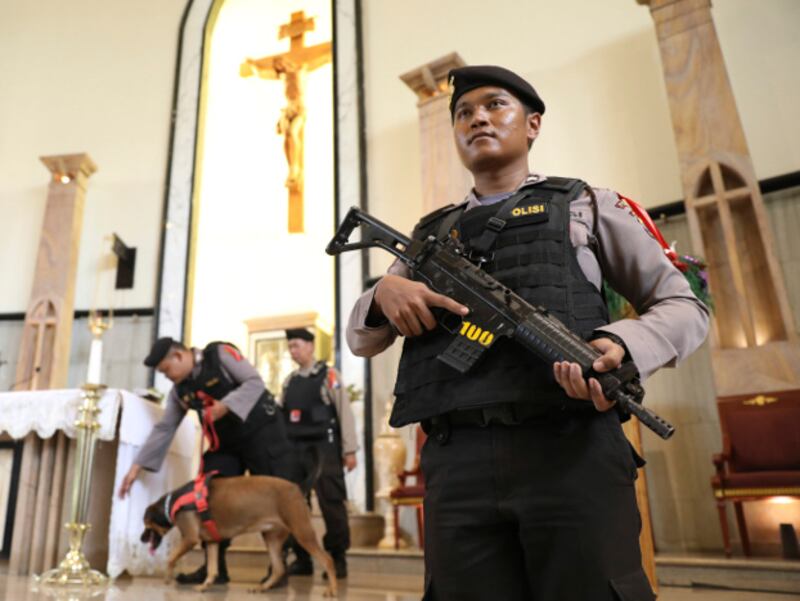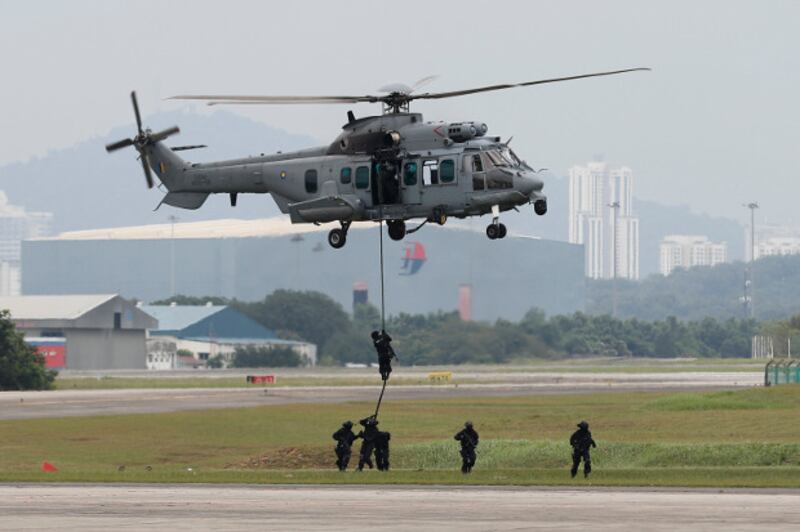The Islamic State extremist group is stepping up recruitment in Muslim-majority Indonesia and Malaysia as well as the Philippines, amid the distraction of a global pandemic, security analysts in these countries told BenarNews.
There are signs that Islamic State is trying to regroup after its territorial defeat in Syria last year through increased efforts to attract new members in Malaysia, other parts of Southeast Asia, the Middle East and North Africa, said Mizan Aslam, a counter-terrorism expert at Universiti Perlis Malaysia.
“ISIS never died,” said Aslam, using another acronym for IS. “Only we said they died, but they themselves never declared it. [M]alaysians are still there [in Syria and Iraq]. Thousands of global jihadists are still there.”
“With all countries focusing on health security and food security, it has given ISIS room to sneak in. This can become a real problem for Malaysia in the near future,” he told BenarNews.
According to him, the group is actively recruiting and indoctrinating supporters through online platforms such as Facebook.
“Recruitment is through social media and not just Malaysia but in the global community affected by [COVID-19] lockdowns,” Aslam said, adding, “People are staying home longer and going through social media non-stop, so the chances of being influenced are there. Islamic State is also seen to have doubled up their effort in dispersing propaganda materials on social media.”
In neighboring Indonesia, the world’s most populous Muslim-majority nation, pro-Islamic State (IS) militants are trying to expand their ranks and plot attacks, the country’s counterterrorism chief said in June.
Police in Central Sulawesi province – a hotbed of extremist activity – told BenarNews in April that Indonesian militants “indeed see the pandemic as an opportunity.”
Indonesian IS-affiliated groups have sworn a pledge of alliance to new IS chief Abu Ibrahim al-Hashemi al-Qurashi, whom the U.S. government calls Amir Muhammad Sa’id ‘Abd-al-Rahman al-Mawla, analysts said.
Meanwhile, a senior Philippine military official told BenarNews that those involved in planning and carrying out twin attacks by female suicide bombers that killed at least 15 people and injured more than 70 on southern Jolo Island last month were members of Daulah Islamiya, the local name for IS, or Philippine groups affiliated with it, including the Abu Sayyaf Group.
There is evidence of more participation by women in the recent strike and vastly improved and accurate deployment of suicide bombers, one analyst said.
The military official said about two dozen pro-IS groups were active in predominantly Muslim southern areas in Jolo, Basilan and the Bangsamoro Autonomous Region in Muslim Mindanao.
“They are the two most prominent IS factions,” the official said, referring to Abu Sayyaf and the Bangsamoro Islamic Freedom Fighters (BIFF).
“Though all fall under Daulah Islamiya in some way or form, perhaps in seeking support, and for multiplying numbers to thwart military advances on the ground. The Maute group, which made a name in Marawi, is also on this list,” he said.
He also was referring to a 2017 siege by pro-IS Filipino and foreign fighters in Marawi that unleased a five-month battle, which left the southern city in ruins.
US counterterrorism chief’s testimony
The analysis by Aslam and other security experts is in line with intelligence received by counterterrorism officials in the United States who say that despite U.S. and coalition efforts, Islamic State and affiliated groups are still pursuing an aggressive global strategy.
IS’s last bastion in Syria fell in March 2019, and its then leader, Abu Bakr al-Baghdadi, was killed during a raid by U.S. Special Forces last October.
Since then, the U.S. and its partner countries have successfully targeted other prominent IS figures, but the group continues to persevere, Christopher Miller, director of the U.S. National Counterterrorism Center, said last week.
“Despite these successes, ISIS has repeatedly demonstrated the ability to rebound from severe losses over the past six years by relying on a dedicated cadre of veteran mid-level commanders, extensive clandestine networks, and downturns in CT [counterterrorism] pressure to persevere,” Miller told a hearing of the U.S. House Homeland Security Committee.
He said that the terror group in May trumpeted attacks in Syria and Iraq under new leader al-Mawla even as it promised more such operations around the world.
Outside of the neighboring Mid-East countries, IS “continues to prioritize the expansion and reinforcement of its global enterprise, which now encompasses some 20 branches and networks,” Miller added.
Since last year, these branches had launched five global campaigns that tout terror attack claims and circulate propaganda videos, he said.

‘IS threat persists in Indonesia’
In June, Indonesia’s new counterterrorism chief, Boy Rafli Amar, sought congressional backing for a 65 percent hike in his agency’s budget, saying it needed more cash and resources as he warned that militants were looking to increase recruitment during the coronavirus pandemic.
“Radical groups are still actively carrying out recruitment propaganda both online and offline during the COVID-19 pandemic,” the National Counterterrorism Agency (BNPT) chief said. “We are seeing today the rampant abuse of the cyberspace to spread the ideology of terrorism.”
Analysts in the country agree.
The threat from the Islamic State persists in Indonesia, Sidney Jones, director at the Jakarta-based Institute for Policy Analysis of Conflict, or IPAC, told BenarNews.
Several pro-IS cells are active in Java, Sumatra and Sulawesi, as is the pro-IS Eastern Indonesia Mujahideen, or MIT, in the jungles of Poso, a regency in Central Sulawesi, she said.
MIT staged a series of attacks earlier this year which were “the direct result of local extremists seeing COVID-19 as an ally in the war against Islam’s enemies,” IPAC said in a report.
“The arrival of the virus gave the Mujahideen of Eastern Indonesia (MIT) a new hope that victory was near, and buoyed by the addition of new recruits, it began a series of attacks.”
The death of al-Baghdadi and the end of the IS-proclaimed caliphate, IPAC’s Jones said, didn’t lead to a decrease in support for IS in Indonesia as some had hoped.
“Several of the pro-IS groups in Indonesia have renewed their bai’at [pledge of allegiance] to al-Quraishi [the new IS leader known also known as al-Mawla],” Jones said, about MIT and another pro-IS hardline group, Jamaah Ansharut Daulah.
“They understand that leadership can change in war, since most belong to groups that have undergone leadership changes themselves.”
Meanwhile, a group to keep an eye on is Jamaah Ansyaarut Khalifah (JAK), which is active in the Javanese cities of Solo and Bekasi, and Palembang, a city in southern Sumatra, a senior researcher at the Center for Radicalism and Deradicalization Studies (PAKAR), told BenarNews.
“This moderate group has hardly ever engaged in violence or planned attacks but that does not mean they are harmless,” PAKAR’s Muhammad Taufiqurrohman said.
“They have been focused on da’wah [preaching] and recruitment, but now they are drawing up plans to send jihadists to the Philippines. In the long run, JAK is more dangerous because it is organized and has a wider network.”
Officials at Indonesia’s National Counterterrorism Agency (BNPT) and Ministry of Foreign Affairs declined to respond to queries for this report. Meanwhile, calls by BenarNews to Malaysia’s Home Minister, the Inspector General of Police and the counterterrorism chief went unreturned.
Social media recruitment in Malaysia
In Malaysia, there is no indication that the terror threat has increased in the country but another analyst agreed that Islamic State was attempting to recruit more members there via social media.
“The absence of overt activities and arrests do not mean the IS recruitment drive has stopped. Low-profile recruitment in Malaysia remains a big headache for our police,” Ahmed El Muhammady, a counterterrorism specialist at the International Islamic University of Malaysia, told BenarNews.
“There may be no increase in the terror threat but the attempt to recruit by spreading propaganda on social media during the COVID-19 lockdown is happening. IS planted the seed of its ideology globally via extensive propaganda via social media, and by doing so, it has a global reach and therefore a global following,” he said.
Even before the pandemic, it appears that social media was being used as an IS recruitment tool in Malaysia, police said last year.
Sixteen suspected militants arrested by Malaysian police in September last year had been actively promoting IS and recruiting new members via social media, said Ayob Khan Mydin Pitchay, the then national police’s counter-terrorism chief.

IS as dangerous as ever
In the Philippines, pro-IS militants have used the opportunity of a pandemic to bolster their ranks, while security forces have been sidetracked with other tasks in helping the government battle the highly contagious and deadly novel coronavirus disease, London-based International Alert, an NGO that advocates for conflict resolution, said in a report in April.
However, even before the pandemic hit, reports from the autonomous Bangsamoro region in the south pointed to the renewed presence of IS-affiliated groups and a general resurgence of violence perpetrated by them, Nikki C. de la Rosa, Country Manager of peacebuilding group International Alert Philippines, told BenarNews.
The Abu Sayyaf-planned twin suicide bombings in Jolo in August were a harbinger of more such deadly attacks, she warned.
“What is now certain is that this [latest] terrorist strike is a clear message that ISIS is as active, committed, and dangerous since it went underground [after the Marawi siege in 2017] and that its force of suicide bombers has not been depleted,” de la Rosa said about the attacks that were carried out by two female bombers.
“The attack [in Sulu province] had the hallmarks of the kind of terrorist assaults waged by ISIS-inspired groups associated with the Abu Sayyaf Group,” de la Rosa said.
She referred to two similar previous attacks in January and June last year in the Sulu province, both of which involved two suicide bombers working in tandem.
“The effective use of asynchronous bombing attacks that we see happening in Sulu may be a foretaste of even worse things to come,” de la Rosa said.
What’s more, the ASG appears to have expanded its operations to radicalizing women, and the involvement of female suicide bombers is “a cause for concern,” she said.
“Some explanations portray this as evidence of the increasing radicalization of women and a higher level of capability of local [violent extremist] groups to prepare, provide logistics, and deploy suicide bombers.”
While this may be true, de la Rosa cautioned that women’s involvement shouldn’t be oversimplified.
“The analysis cannot be devoid of the context – or the role played by poverty, inequality, injustice, and discrimination that is felt more intensely by women and is central to the thesis of a potentially significant gender link to violent conflict specifically among poor female-headed households in Muslim Mindanao.”
